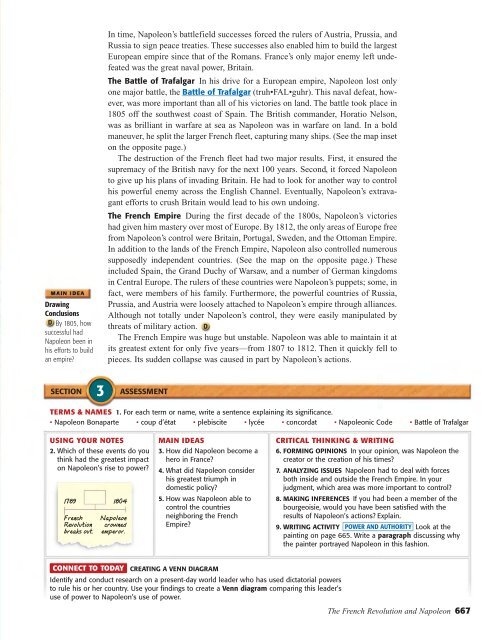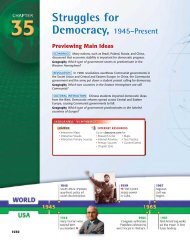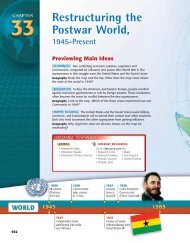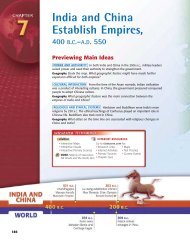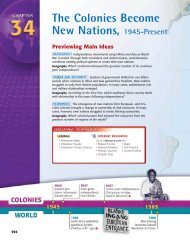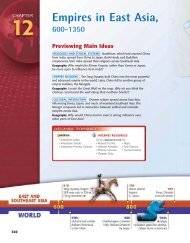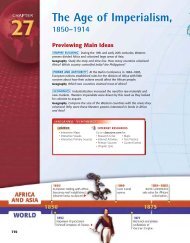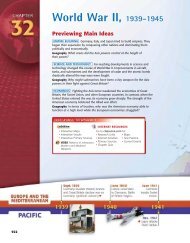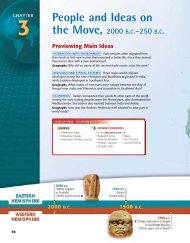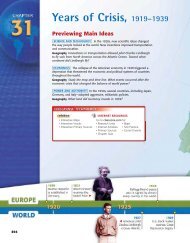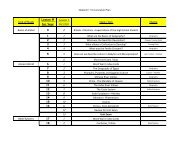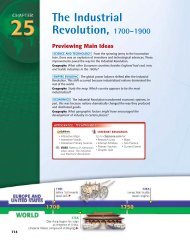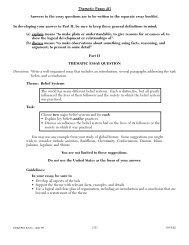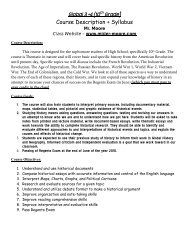The French Revolution and Napoleon, 1789-1815 - First
The French Revolution and Napoleon, 1789-1815 - First
The French Revolution and Napoleon, 1789-1815 - First
Create successful ePaper yourself
Turn your PDF publications into a flip-book with our unique Google optimized e-Paper software.
Drawing<br />
Conclusions<br />
By 1805, how<br />
successful had<br />
<strong>Napoleon</strong> been in<br />
his efforts to build<br />
an empire?<br />
SECTION 3 ASSESSMENT<br />
TERMS & NAMES 1. For each term or name, write a sentence explaining its significance.<br />
• <strong>Napoleon</strong> Bonaparte • coup d’état • plebiscite • lycée • concordat • <strong>Napoleon</strong>ic Code • Battle of Trafalgar<br />
USING YOUR NOTES<br />
2. Which of these events do you<br />
think had the greatest impact<br />
on <strong>Napoleon</strong>’s rise to power?<br />
<strong>1789</strong> 1804<br />
<strong>French</strong><br />
<strong>Revolution</strong><br />
breaks out.<br />
In time, <strong>Napoleon</strong>’s battlefield successes forced the rulers of Austria, Prussia, <strong>and</strong><br />
Russia to sign peace treaties. <strong>The</strong>se successes also enabled him to build the largest<br />
European empire since that of the Romans. France’s only major enemy left undefeated<br />
was the great naval power, Britain.<br />
<strong>The</strong> Battle of Trafalgar In his drive for a European empire, <strong>Napoleon</strong> lost only<br />
one major battle, the Battle of Trafalgar (truh•FAL•guhr). This naval defeat, however,<br />
was more important than all of his victories on l<strong>and</strong>. <strong>The</strong> battle took place in<br />
1805 off the southwest coast of Spain. <strong>The</strong> British comm<strong>and</strong>er, Horatio Nelson,<br />
was as brilliant in warfare at sea as <strong>Napoleon</strong> was in warfare on l<strong>and</strong>. In a bold<br />
maneuver, he split the larger <strong>French</strong> fleet, capturing many ships. (See the map inset<br />
on the opposite page.)<br />
<strong>The</strong> destruction of the <strong>French</strong> fleet had two major results. <strong>First</strong>, it ensured the<br />
supremacy of the British navy for the next 100 years. Second, it forced <strong>Napoleon</strong><br />
to give up his plans of invading Britain. He had to look for another way to control<br />
his powerful enemy across the English Channel. Eventually, <strong>Napoleon</strong>’s extravagant<br />
efforts to crush Britain would lead to his own undoing.<br />
<strong>The</strong> <strong>French</strong> Empire During the first decade of the 1800s, <strong>Napoleon</strong>’s victories<br />
had given him mastery over most of Europe. By 1812, the only areas of Europe free<br />
from <strong>Napoleon</strong>’s control were Britain, Portugal, Sweden, <strong>and</strong> the Ottoman Empire.<br />
In addition to the l<strong>and</strong>s of the <strong>French</strong> Empire, <strong>Napoleon</strong> also controlled numerous<br />
supposedly independent countries. (See the map on the opposite page.) <strong>The</strong>se<br />
included Spain, the Gr<strong>and</strong> Duchy of Warsaw, <strong>and</strong> a number of German kingdoms<br />
in Central Europe. <strong>The</strong> rulers of these countries were <strong>Napoleon</strong>’s puppets; some, in<br />
fact, were members of his family. Furthermore, the powerful countries of Russia,<br />
Prussia, <strong>and</strong> Austria were loosely attached to <strong>Napoleon</strong>’s empire through alliances.<br />
Although not totally under <strong>Napoleon</strong>’s control, they were easily manipulated by<br />
threats of military action.<br />
<strong>The</strong> <strong>French</strong> Empire was huge but unstable. <strong>Napoleon</strong> was able to maintain it at<br />
its greatest extent for only five years—from 1807 to 1812. <strong>The</strong>n it quickly fell to<br />
pieces. Its sudden collapse was caused in part by <strong>Napoleon</strong>’s actions.<br />
<strong>Napoleon</strong><br />
crowned<br />
emperor.<br />
MAIN IDEAS<br />
3. How did <strong>Napoleon</strong> become a<br />
hero in France?<br />
4. What did <strong>Napoleon</strong> consider<br />
his greatest triumph in<br />
domestic policy?<br />
5. How was <strong>Napoleon</strong> able to<br />
control the countries<br />
neighboring the <strong>French</strong><br />
Empire?<br />
CONNECT TO TODAY CREATING A VENN DIAGRAM<br />
Identify <strong>and</strong> conduct research on a present-day world leader who has used dictatorial powers<br />
to rule his or her country. Use your findings to create a Venn diagram comparing this leader’s<br />
use of power to <strong>Napoleon</strong>’s use of power.<br />
CRITICAL THINKING & WRITING<br />
6. FORMING OPINIONS In your opinion, was <strong>Napoleon</strong> the<br />
creator or the creation of his times?<br />
7. ANALYZING ISSUES <strong>Napoleon</strong> had to deal with forces<br />
both inside <strong>and</strong> outside the <strong>French</strong> Empire. In your<br />
judgment, which area was more important to control?<br />
8. MAKING INFERENCES If you had been a member of the<br />
bourgeoisie, would you have been satisfied with the<br />
results of <strong>Napoleon</strong>’s actions? Explain.<br />
9. WRITING ACTIVITY POWER AND AUTHORITY Look at the<br />
painting on page 665. Write a paragraph discussing why<br />
the painter portrayed <strong>Napoleon</strong> in this fashion.<br />
<strong>The</strong> <strong>French</strong> <strong>Revolution</strong> <strong>and</strong> <strong>Napoleon</strong> 667


